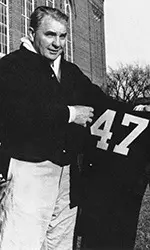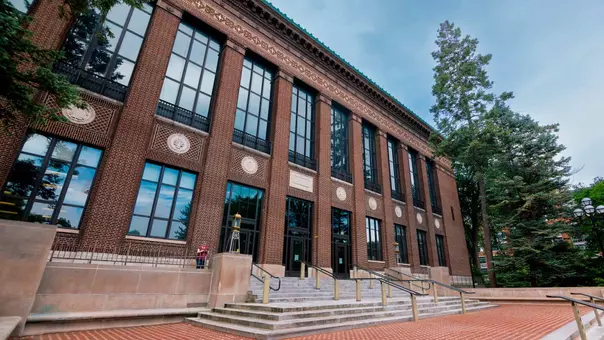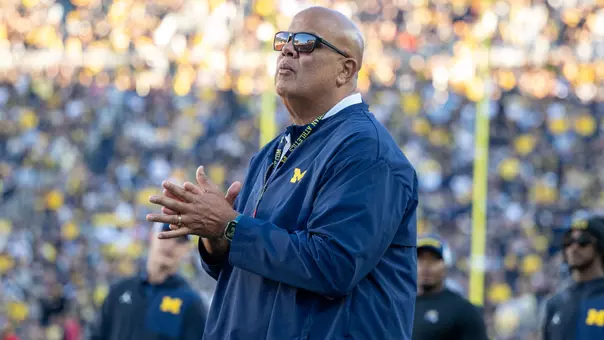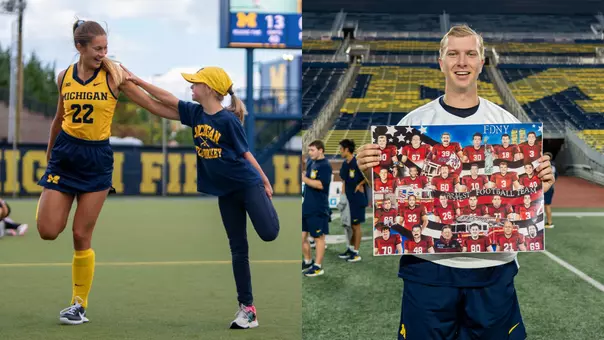
Our Venue Namesakes: Ocker, Oosterbaan
8/26/2015 12:00:00 AM | General
Aug. 26, 2015

This four-part series focuses on the men and women who helped shape the Stephen M. Ross Athletic Campus. The first part focuses on Phyllis Ocker and Bennie Oosterbaan.
OCKER FIELD -- PHYLLIS OCKER (Field Hockey/Administration, 1974-77)
In the mid-1970s, nobody advocated for women's athletics at Michigan more than Phyllis Ocker.
In 1973, Ocker was appointed to the Burns Committee to investigate the development of women's intercollegiate sports at Michigan. Title IX was passed a year earlier, and though that legislation compelled many universities to organize formal women's athletics programs, Michigan was initially not one of them.
The Committee recommended that the university establish six varsity sports for women beginning with the 1973-74 academic year: tennis, basketball, swimming and diving, synchronized swimming, volleyball and field hockey.
She was named head coach for the field hockey program in 1974 and led the Wolverines to a 33-33-3 record in four years. In 1977, she was named interim associate director of women's athletics by then-athletic director Don Canham while continuing to coach the field hockey program and teach physical education at the university.

In 1978, Ocker stepped away from coaching and became permanent director of women's athletics. In her 13 years in the role, Michigan went from having six part-time head coaches, 20 scholarships and limited access to training staff and facilities to a staff of more than 30 full-time coaches and support staff, more than 100 scholarships and renovated or new facilities devoted to women's athletics. In terms of spending, the department went from $100,000 in 1974 to $2.4 million in 1990.
In the Nov/Dec 1990 issue of Michigan Alumnus, Ami Walsh wrote, "For twenty-nine years, she has remained one of the department's staunchest supporters, a quiet diplomat who gently but firmly guided the U-M women's varsity athletic program through its infancy and, perhaps, its most tumultuous times."
The field hockey field was dedicated in her honor in 1995 and received a $13.5 million renovation after the 2013 season.

Ocker Field (left) and Oosterbaan Field House (right)
OOSTERBAAN FIELD HOUSE -- BENNIE OOSTERBAAN (Football/Basketball/Baseball, 1925-28)
To this day, Bennie Oosterbaan remains one of the best pure athletes in the history of Michigan Athletics. From 1925-28, he earned nine varsity letters, three each in football, basketball and baseball.
On the gridiron, Oosterbaan was a skilled two-way player. As a sophomore, he led the Big Ten in touchdowns (eight) while also playing defensive end. He quarterbacked the team in 1927, coincidentally the first year football that was played at Michigan Stadium.
He is one of two players in program history to become a three-time All-American (1925-27), the other being wide receiver Anthony Carter (AP, 1980-82). Oosterbaan was also the first All-American in Michigan basketball history (1927-28) and was an All-Big Ten selection in baseball, leading the conference in batting in 1928.
According to Ron Kramer (football, 1954-56), Oosterbaan was offered pro contracts in football and baseball but turned them down due to his family belonging to the Dutch Reform Church, ruling out participation on Sundays. As a result, he went into coaching but never left Michigan.
He doubled as assistant coach in both football and basketball before becoming the head coach in both sports, first in basketball (1938-46) and later in football (1948-58).

In his first year as head football coach, he was named AFCA National Coach of the Year after leading Michigan to a perfect 9-0 record and both Big Ten and national championships. He went 63-33-4 with nine winning seasons, three Big Ten titles and seven top-20 national finishes.
Oosterbaan was inducted into the College Football Hall of Fame in 1954 and retired four years later. He was inducted into the University of Michigan Athletics Hall of Honor in 1978, and in 1999, he was ranked fourth on the list of the 50 Greatest Sports Figures from Michigan by Sports Illustrated, behind Joe Louis, Magic Johnson and Charlie Gehringer.
Oosterbaan Field House, built in 1970, is the indoor home playing field for the men's and women's lacrosse teams. Prior to Glick Field House opening in August 2009, it was the indoor practice facility for the football team. Today, it also serves as an indoor practice facility for a number of varsity teams, as well as for the university's intramural and club sports programs.
The 2015-16 academic year marks the 150th anniversary of Michigan Athletics. We invite the University of Michigan family to celebrate the passion that fuels us, rediscover the stories and traditions that unite us, and imagine what the future holds for us. We look forward to celebrating "This Michigan of Ours." To share a memory of Michigan Athletics, please fill out our online form or email goblue150@umich.edu.










